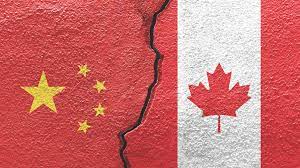US Pushers of War with China Find Canadian Allies

All Global Research articles can be read in 51 languages by activating the “Translate Website” drop down menu on the top banner of our home page (Desktop version).
To receive Global Research’s Daily Newsletter (selected articles), click here.
Follow us on Instagram and Twitter and subscribe to our Telegram Channel. Feel free to repost and share widely Global Research articles.
***
House Speaker Nancy Pelosi’s planned trip to Taiwan combined with the head of the US military Mark Milley recently calling the Chinese military “noticeably more aggressive” has greatly ratcheted up tensions with the world’s most populous nation.
Major Canadian media and think tanks are pressing for this country to join the conflict. They have recently offered suggestions on how to “win the new Cold War” with China (Globe and Mail), called for promoting Taiwanese independence (McDonald Laurier Institute) and accused the country of “committing mass atrocity crimes and grave human rights violations against the Uyghurs and other Turkic Muslims” (Toronto Star).Through endless stories in recent years about Chinese spying and technology theft, as well as influence over Canadian cultural and schooling initiatives, the dominant media has established the ideological terrain for conflict. Echoing ‘Russiagate’ nonsense, last month former Conservative leader Erin O’Toole even claimed his party lost “about eight or nine seats” in the last election due to Chinese interference.
On spurious security grounds, the Trudeau government recently conceded to US and media pressure to ban the world’s largest 5G network provider, Huawei, from building its cutting-edge broadband in Canada. During a meeting with her US counterpart last month Finance Minister Chrystia Freeland raised the idea of “friend-shoring”. If pursued seriously, this could lead to delinking economically from China and Russia.
Concurrently, Canada and the US have been working together to combat Chinese dominance over rare earth minerals used to produce electric cars and other newer technologies. Earlier in the year, opposition politicians and the media demanded Ottawa block a Chinese firm from purchasing lithium deposits a Canadian company controlled in northwestern Argentina. How dare the Chinese take our Argentinian resources!
With US military bases and warships encircling the Asian nation, Canadian vessels and aircraft are increasingly present near China’s territorial waters and airspace. Four Canadian naval vessels are participating in the Rim of the Pacific Exercise (RIMPAC), a massive month-long US-led training that largely takes place off of Hawaii. The wargames partly target China.
Alongside their US counterparts, Canadian vessels have run provocative manoeuvres in the South China Sea. While they claim to be upholding the “international rules-based order” in these missions, the USA refuses to recognize the Law of the Sea.
In early June it was reported that Chinese jets had repeatedly buzzed Canada’s CP-140 Aurora surveillance plane operating near its territory. A Global News story — likely instigated by Canada’s military — claimed Chinese pilots flew so close to “sometimes see them raising their middle fingers.” (Flipping the bird is not a common Chinese cultural practice.) Probably hoping to prod a (somewhat) reluctant Trudeau government to condemn the Chinese, the military got what they wanted. Asked about Chinese aggressiveness towards Canadian forces 8,000 km from their territory, Prime Minister Trudeau told reporters, “the fact that China would have chosen to do this is extremely troubling, so we will be bringing it up directly with Chinese officials and (government) counterparts and ensuring that this doesn’t continue to be part of an escalatory pattern.”
At the NATO summit in Spain last month the alliance released a new strategic concept that for the first-time listed China. It labeled Beijing a challenge to the alliance’s “interests, security and values”. NATO’s Secretary General Jens Stoltenberg declared,
“China is substantially building up its military forces, including nuclear weapons, bullying its neighbours, threatening Taiwan … monitoring and controlling its own citizens through advanced technology, and spreading Russian lies and disinformation… China is not our adversary, but we must be clear-eyed about the serious challenges it represents.”
At a time when international cooperation is essential to mitigate the climate crisis and global health threats, a sizable segment of Canada’s ruling elite is stoking conflict with China.
Could Canada actually follow the US into war with China?
*
Note to readers: Please click the share buttons above or below. Follow us on Instagram and Twitter and subscribe to our Telegram Channel. Feel free to repost and share widely Global Research articles.
Featured image is from Yves Engler

